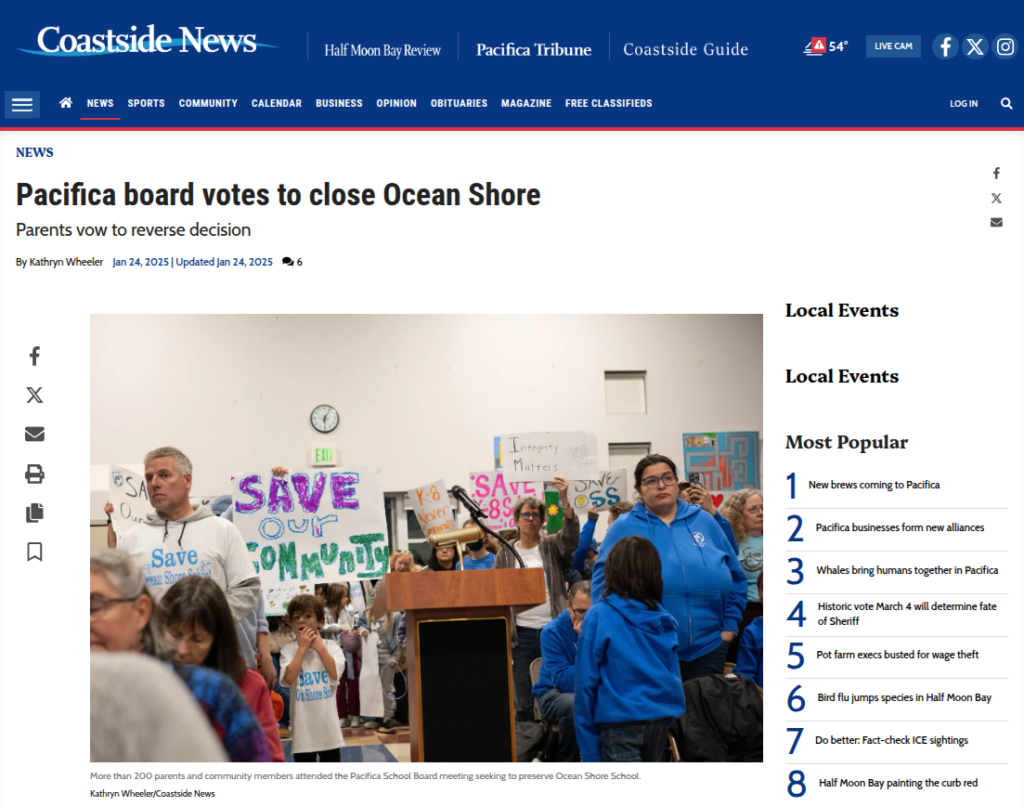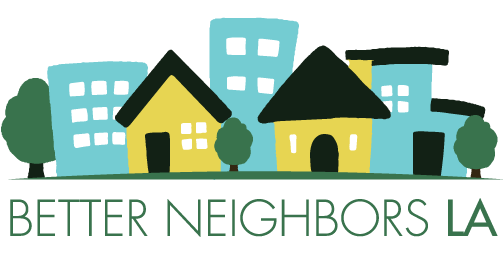
PACIFICA HOMES are NOT HOTELS
PREPARE! The ordinance goes before the California Coastal Commission February 4th!
THIS IS IT!
Pacifica’s STR ordinance goes before the California Coastal Commission 2/4/26. We are in the home stretch! SHOW YOUR SUPPORT!
Attend the Coastal Commission’s next meeting in Half Moon Bay
WHERE: Oceano Hotel & Spa, 280 Capistrano Rd., Half Moon Bay, CA 94019
WHEN: Wednesday, Feb 4th. We strongly recommend that anyone attending in-person or by Zoom be there no later than noon
Email the Commission ahead of the meeting
Email the Commission now, showing how important their approval is to the community.
To: northcentralcoast@coastal.ca.gov
Subject: ITEM NO: W15a, LCP Amendment Number LCP-2-PAC-25-0079-2 (City of Pacifica Short-Term Rentals)

NEED HELP GETTING THERE, OR DRAFTING YOUR MESSAGE?
Email us at: info@pacificahomesarenothotels.org
WHY YOU SHOULD CARE
Unhosted STRs—a/k/a “whole house” AirBnb and VRBO short-term rentals—have come under scrutiny by many cities across the world because of their destabilizing effects on residential neighborhoods, particularly in terms of depleting the affordable housing stock, raising rents, and causing disturbances related to noise, trash, and parking.
- In any town or city where there are Airbnb listings, there is a predictable increase in rents and housing prices. In fact, during the years 2014-17, one-fifth of all increases in rents across the U.S. were found to be directly related to Airbnb operations.
- There is a direct correlation between the number of unhosted STRs in a city and the number of its unhoused. When looking at LA, it was determined that unhosted STRs were responsible for more than 5,000 extra people experiencing homelessness each night
UNHOSTED STRs DEPLETES NEW HOUSING STOCK: Shockingly, the City is processing STR permit applications for vacant lots, such as 2105 Beach Boulevard, where a full-time, unhosted STR multi-unit is planned.
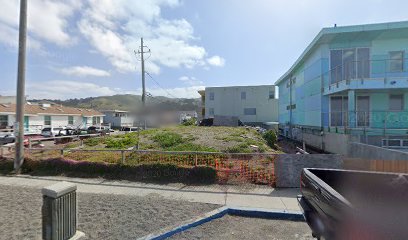
This lot is owned by an out-of-town, corporate operator who already runs multiple unhosted STRs.
UNSAFE ACCOMMODATIONS: Several operators are illegally renting out auxiliary dwelling units (ADUs) as unhosted STRs. Others have converted structures like garages, often unpermitted and likely non-compliant with Chapter 12 of the building code. This image shows modification of a garage of a corporately owned unhosted STR into an unpermitted dwelling space.
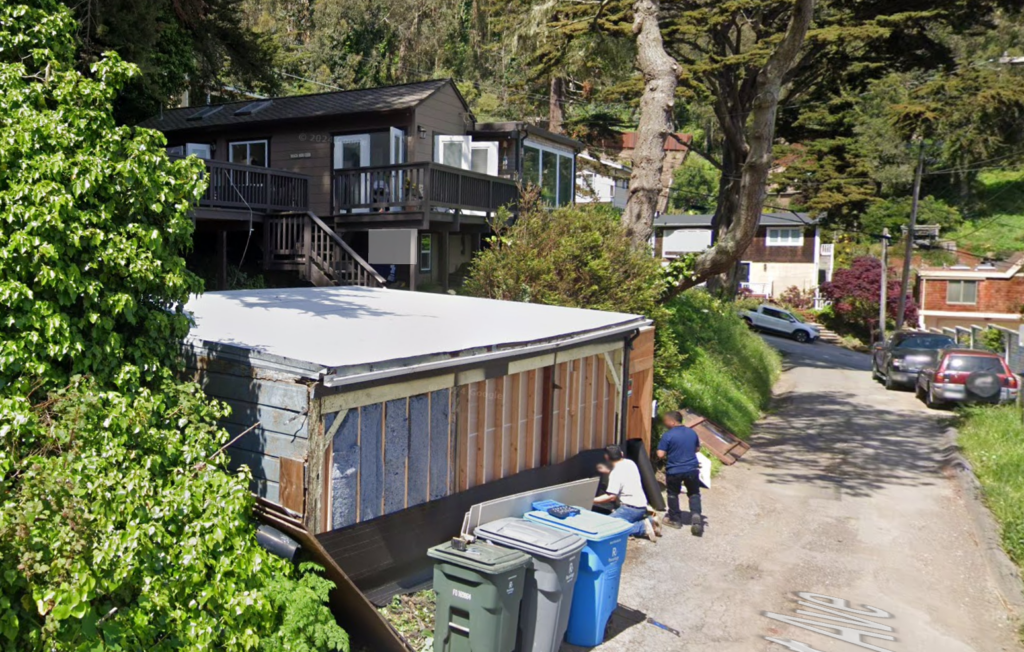
LOCAL EFFECTS

A study presented to the California Coastal Commission by Dr. David Wachsmuth, Chair of Urban Studies at McGill University shows unhosted STRs deplete the housing stock in any community in which they operate. Here are the effects in Pacifica:
– Only 34 long-term rentals are available in Pacifica (as of 6/24/24)
– The rate of home ownership in Pacifica has been declining since 2019; it is now at 68.5% (compare this rate to neighboring Montara, where home ownership rate is 89.9%)
– Pacifica’s population has declined 10.3% since the 2020 census, and unhosted STRs have likely played a role.
LOST SCHOOL FUNDING
Full-time unhosted STRs displace families that would otherwise live in the home being rented out, and thereby reduce student enrollment that our local schools depend upon for funding.
- 87% of unhosted STRs in Pacifica that are run by out-of-town operators comprise at least 2 bedrooms, making them suitable for a resident family.
- If just half the unhosted STRs in Pacifica were home to even one child, our schools would have received well over $1.5 million dollars in additional funding each year.
- School year 2019-2020: $1.57 million lost
- School year 2020–2021: $1.62 million lost
- School year 2021-2022: $2.07 million lost
- The California DoE Budget Act for 2023-24 increased the per-pupil funding amount. Meaning that our schools are on track to lose $2.3 million this year due to unhosted STRs.
- That’s a combined loss of $7.56 million in the past 4 years
ECONOMIC DAMAGE
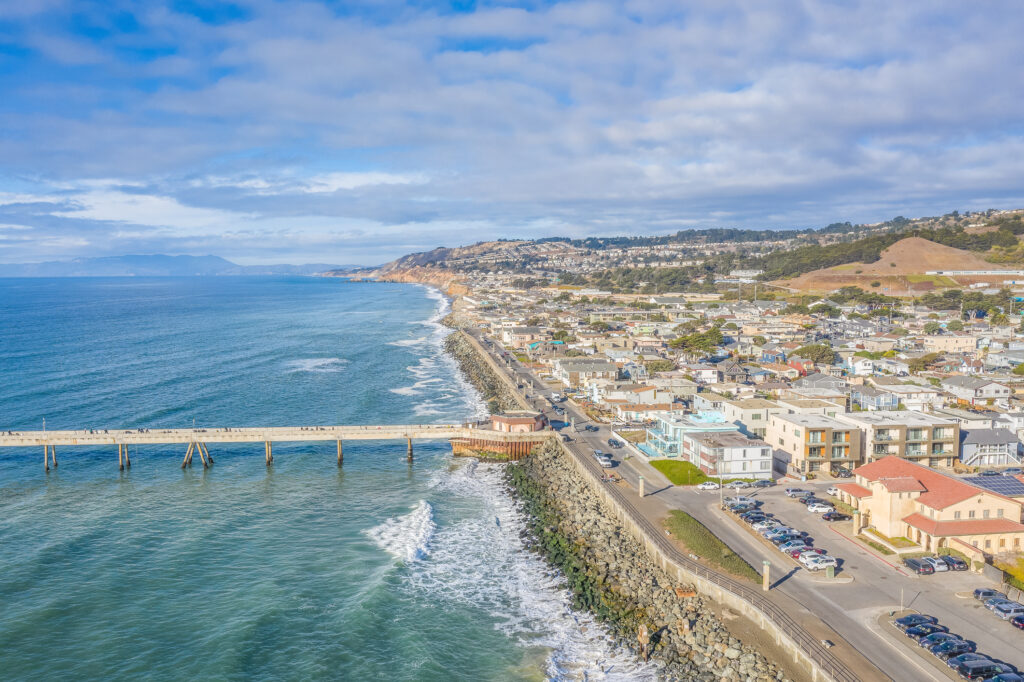
While unhosted STR guests may frequent local businesses during their stay, like markets and restaurants, they are simply not spending money in Pacifica like a resident would. For instance, they are not buying groceries weekly, filling up regularly at our gas stations, taking their pets to the local veterinarian, going to the local dentist, using local the dry cleaners, shopping at the local hardware store, or getting their prescriptions filled at the local drugstore. Furthermore, they are not supporting our local non-profits or making donations to our local Police Officers’ Association. Measuring the “benefits” of STR guests’ spending against residents full-time spending makes it clear: Displacing residents hurts Pacifica’s economy.
In fact, a 2015 study by San Francisco’s Office of Economic Analysis shows that San Francisco city lost $250,000-$300,000 per year for every unhosted STR in operation.
Applying the model to Pacifica, and limiting the number of unhosted STRs the proposed cap of 150 (in fact, the number is closer to 200) the estimated annual loss to Pacifica’s economy is $37.5 million dollars. That loss totally eclipses the $1.7 million received in ToT income.
COMPARISON TO NEIGHBORING CITIES
Other communities in our county have strengthened their controls on unhosted STRs, but Pacifica badly lags behind. In the absence of adequate protection, the number of unhosted STRs are disproportionately higher in Pacifica than other cities of San Mateo County.
- Pacifica ranks 2nd in the number of unhosted STRs per resident, beating out 16 other San Mateo communities, including
- San Bruno
- San Mateo
- South San Francisco
- Milbrae
- Pacifica has more unhosted STRs than the combined total of these 4 cities
- Foster City
- San Carlos
- Burlingame
- East Palo Alto
- Pacifica has only 2 fewer unhosted STRs than the combined total of these 8 cities
- Half Moon Bay
- Belmont
- Atherton
- Woodside
- Brisbane
- Hillsborough
- Colma
- Portola Valley
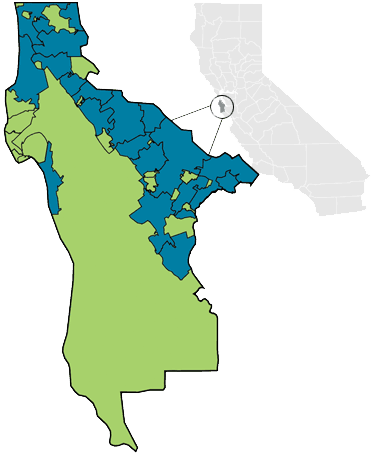

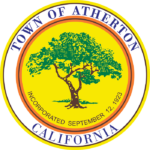
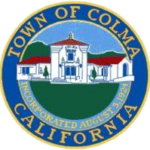

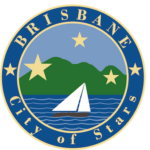



























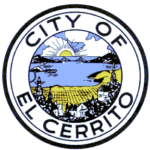
REGULATIONS IN OTHER CITIES
Throughout San Mateo County, throughout California, and even throughout the world, cities have taken measures to restrict unhosted STRs, and reverse the damage they have caused to their communities.
Other cities have
- primary residency requirements
- limits on the number of unhosted STRs an owner may operate
- cap on the number of nights an unhosted STR may be booked
PLATFORM ACCOUNTABILITY
Platform Accountability is the most economical and most effective way to enforce STR ordinances. It puts the onus on the rental platforms, not the city, to police illegal listings. Rental platforms can only collect a booking fee on the stuff that’s properly registered and legal, and are penalized for listing illegal properties.
HOW PLATFORM ACCOUNTABILITY WORKS
- Every STR operator must apply for a registration number
- The rental platform is required to include that registration number on the listing
- The platform is fined if a listing appears without a license
PLATFORM ACCOUNTABILITY IN ACTION
In San Francisco, every month Airbnb delivers a spreadsheet detailing the rental activity of every STR to the SF Office of Short Term Rentals.
The City goes through the list and identifies violations and has Airbnb remove them within a week.
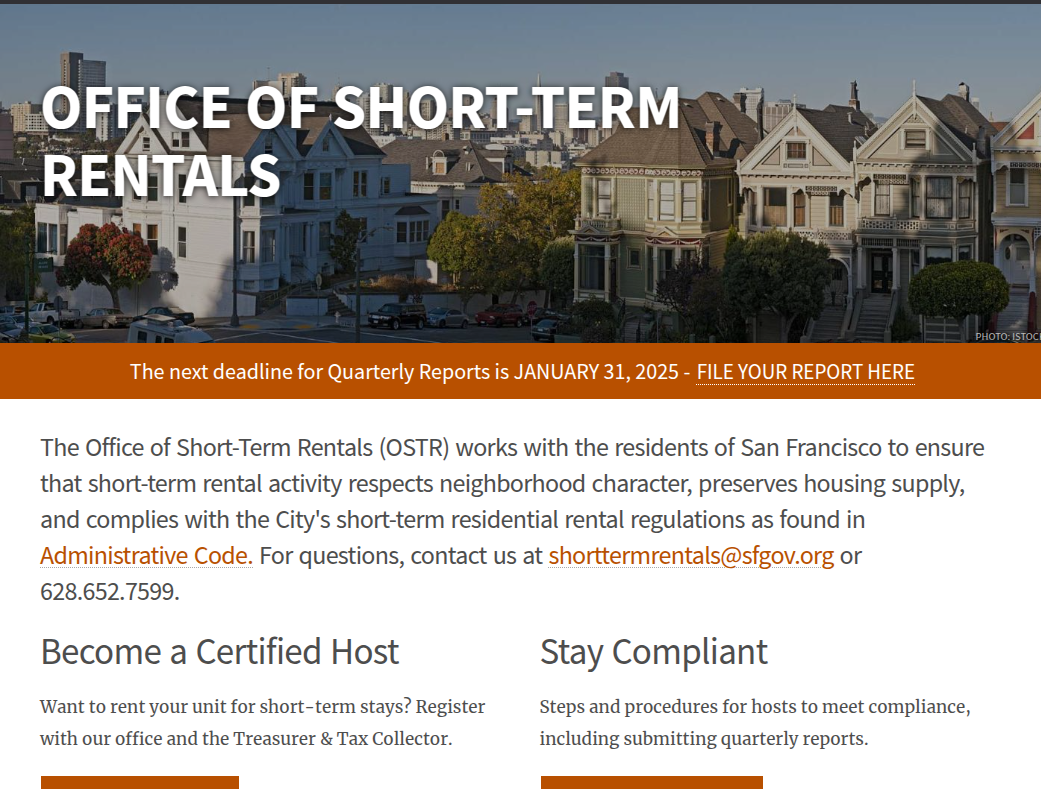

STRs MYTHS vs. FACTS
The idea that STRs are exclusively a means for local residents to supplement their income by renting a room in home. Nor is it that unhosted STRs have a positive effect on the economies
OTHER NEIGHBORHOOD GROUPS AND FRIENDS
About Us
We are grass-roots group of Pacifica residents, concerned about the proliferation of unhosted STRs in our neighborhoods. Our goal is update the City of Pacifica’s current STR ordinance to halt the conversion of much-needed housing into unhosted short-term vacation rentals. We seek to stem economic losses and the loss of community, character, and quality of life of our neighborhoods when unregulated hotels are allowed to operate in residential areas.
Join us, or reach out for more information. Email us at info@pacificahomesarenothotels.org
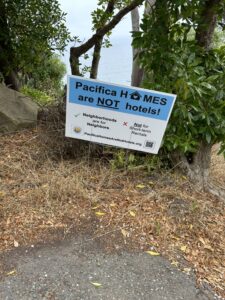
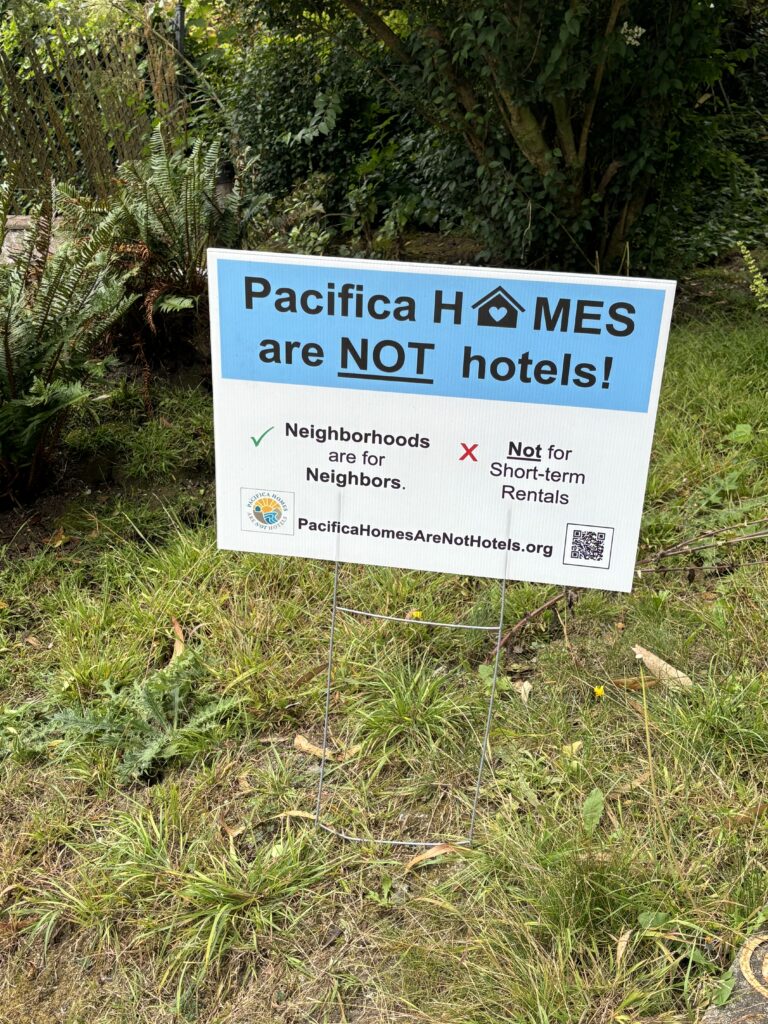
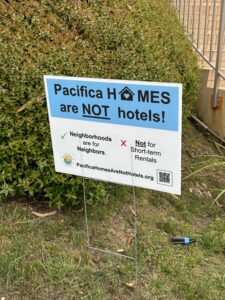
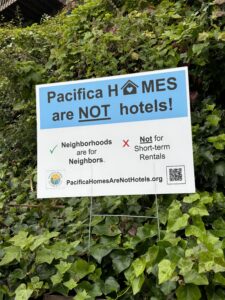
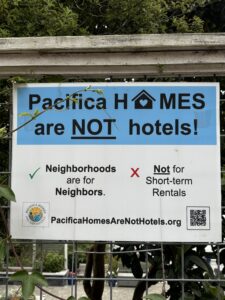
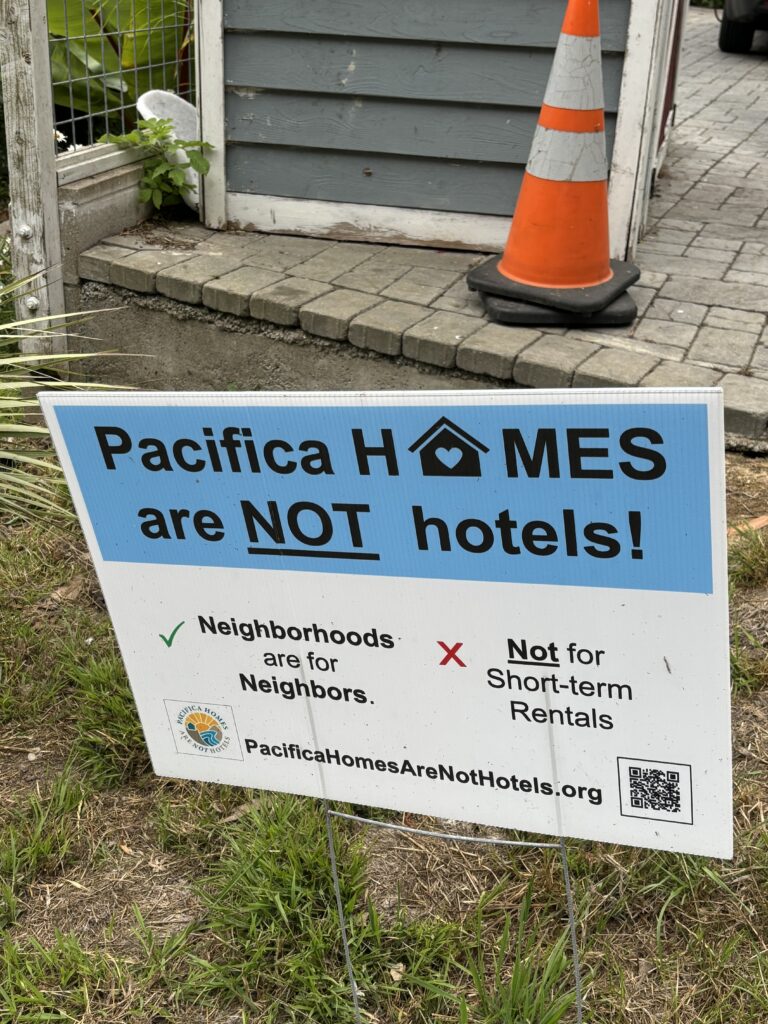
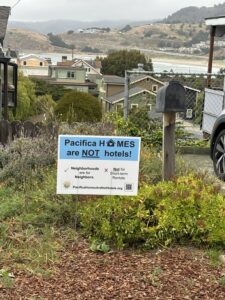
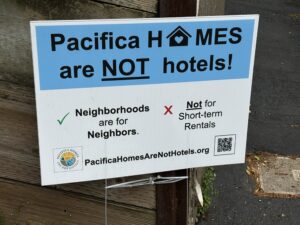
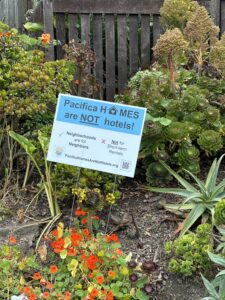
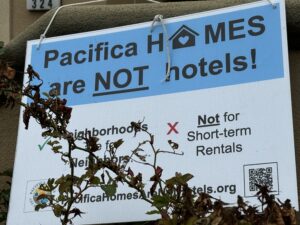
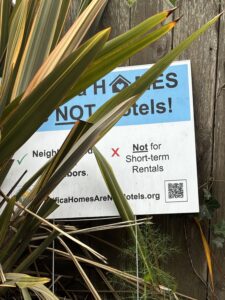
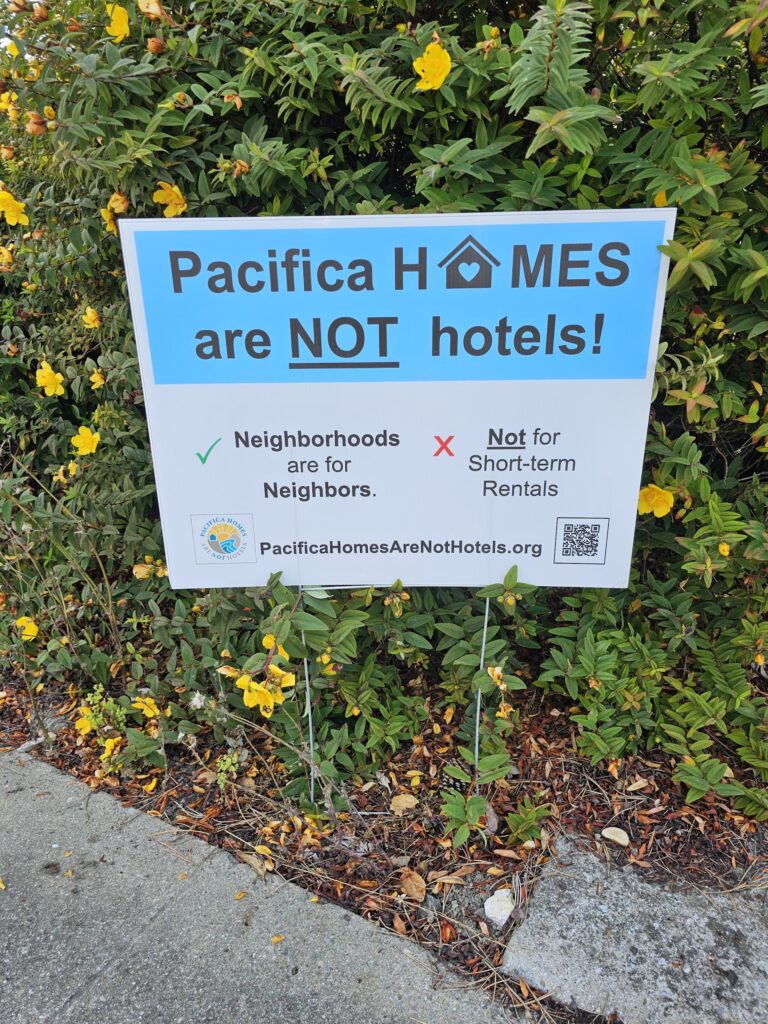
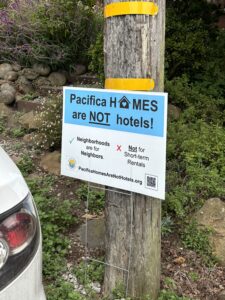
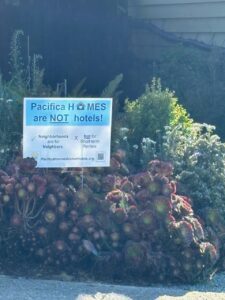
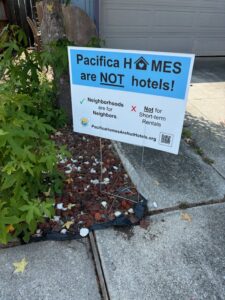

“For the past 2-3 years, every time a house sells in the neighborhood, you hold your breath wondering if you’ll have a great new neighbor or nights of loud parties and densely parked cars. Sadly it’s more often been the latter.”
Debi Hirshlag
Resident, Pedro Point

“A large home across the street from me was bought as an investment by a corporation that has it almost constantly booked as if it were a hotel. The house is used for business meetings, religious retreats, and large gatherings as well as more traditional vacation rentals. Often ten cars are parked along the hill. I do not feel safe with all these strangers coming and going. It changed the atmosphere of our street.”
P. Kephart
Resident, Linda Mar

“Almost all short-term rentals are conducted as businesses. In Pacifica, the current ordinance gives no considerations or protections to the neighboring homes and their residents. I live in a zoned residential area of Pacifica…my street is NOT supposed to be for commercial use.”
Kate Chinca
Resident, Park Pacifica
